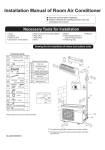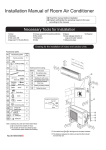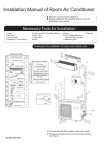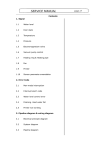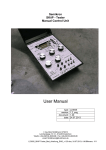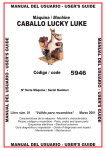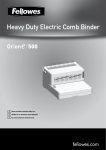Download Haier 0010515194 Air Conditioner User Manual
Transcript
Installation Manual of Room Air Conditioner Read this manual before installation Explain sufficiently the operating means to the user according to this manual. Necessary Tools for Installation 1.Driver 2.Hacksaw 3.Hole core drill 4.Spanner(17,19 and 26mm) 5.Torque wrench(17mm,22mm,26mm) 6.Pipe cutter 7.Flaring tool 8.Knife 9.Nipper 10.Gas leakage detector or soap-and-water solution 11.Measuring tape 12.Reamer Drawing for the installation of indoor and outdoor units Accessory parts 1 2 Accessory parts Remote controller R-03 dry battery Number of articles more than 5cm No. 1 2 mo re th an 1 3 1 4 Drain hose 5 6 7 4X25 Screw Plastic cap 4 Drain-elbow 1 Cushion 4 m Optional parts for piping Mark Mounting plate 10c Parts name A Non-adhesive tape B Adhesive tape C Saddle(L.S) with screws D E Connecting electric cable for indoor and outdoor Drain hose F Heating insulating material G mo re th an 10c Attention must be paid to the rising up of drain hose Piping hole cover Arrangement of piping directions mo re Rear left tha Left m n1 0c Rear right m an re th 10c mo Right Below D E more than 60cm more than The marks from A to G in the figure are the parts numbers. The distance between the indoor unit and the floor should be more than 2m. No.0010515194 15c m m 256 140 500 140 Floor fixing dimensions of the outdoor unit (Unit:mm) Fixing of outdoor unit Fix the unit to concrete or block with bolts( 10mm) and nuts firmly and horizontally. When fitting the unit to wall surface, roof or rooftop, fix a supporter surely with nails or wires in consideration of earthquake and strong wind. If vibration may affect the house, fix the unit by attaching a vibration-proof mat. Indoor Unit Selection of Installation Place Place, robust not causing vibration, where the body can be supported sufficiently. Place, not affected by heat or steam generated in the vicinity, where inlet and outlet of the unit are not disturbed. Place, possible to drain easily, where piping can be connected with the outdoor unit. Place, where cold air can be spread in a room entirely. Place, nearby a power receptacle, with enough space around. (Refer to drawings). Place where the distance of more than lm from televisions, radios, wireless apparatuses and fluorescent lamps can be left. In the case of fixing the remote controller on a wall, place where the indoor unit can receive signals when the fluorescent lamps in the room are lightened. Outdoor Unit Place, which is less affected by rain or direct sunlight and is sufficiently ventilated. Place, possible to bear the unit, where vibration and noise are not increased. Place, where discharged wind and noise do not cause a nuisance to the neighbors. Place, where a distance marked is available as illustrated in the above figure. Power Source Before inserting power plug into receptacle, check the voltage without fail. The power source is the same as the corresponding name plate. Install an exclusive branch circuit of the power. A receptacle shall be set up in a distance where the power cable can be reached. Do not extend the cable by cutting it. Selection of pipe To this unit, both liquid and gas pipes shall be insulated as they become Iow temperature in operation. Use optional parts for piping set or pipes covered with equivalent insulation material. The thickness of the pipe must be 0.8mm at least. Liquid pipe 6.35mm(1/4") Gas pipe 9.52mm(3/8") 2 Indoor unit 1.Fitting of the Mounting Plate and Positioning of the wall Hole When the mounting plate is first fixed 1.Carry out, based on the neighboring pillars or lintels, a proper leveling for the plate to be fixed against the wall, then temporarily fasten the plate with one steel nail. 2. Make sure once more the proper level of the plate, by hanging a thread with a weight from the central top of the plate, then fasten securely the plate with the attachment steel nail. 3. Find the wall hole location A using a measuring tape A=180mm 35 B=70mm Find the level position When the mounting plate is fixed side bar and lintel Fix to side bar and lintel a mounting bar, Which is separately sold, and then fasten the plate to the fixed mounting bar. Refer to the previous article, " position of wall hole. When the mounting plate is first fixed ", for the 2.Making a Hole on the Wall and Fitting the Piping Hole Cover Make a hole of B mm in diameter, slightly descending to outside the wall. Install piping hole cover and seal it off with putty after installation Indoor side Wall hole B (Section of wall hole) 3 Outdoor side Thickness of wall Piping hole pipe Indoor unit 3.Installation of the Indoor Unit Drawing of pipe Rear piping Draw pipes and the drain hose, then fasten them with the adhesive tape Left Left-rear piping In case of left side piping, cut away, with a nipper, the lid for left piping. In case of left-rear piping, bend the pipes according to the piping direction to the mark of hole for left-rear piping which is marked on heat insulation materials. 1. Insert the drain hose into the dent of heat insulation materials of indoor unit. 2. Insert the indoor/outdoor electric cable from backside of indoor unit, and pull it out on the front side, then connect them. 3. Coat the flaring seal face with refrigerant oil and connect pipes. Cover the connection part with heat insulation materials closely, and make sure fixing with adhesive tape Heat insulation material Drain hose Lid for right piping Piping Indoor/outdoor electric cable Lid for left piping Lid for under piping pipe Fix with adhesive tape Indoor/outdoor electric cable and drain hose must be bound with refrigerant piping by protecting tape. Other direction piping Cut away, with a nipper, the lid for piping according to the piping direction and then bend the pipe according to the position of wall hole. When bending, be careful not to crash pipes. Connect beforehand the indoor/outdoor electric cable, and then pull out the connected to the heat insulation of connecting part specially. Fixing the indoor unit body Hang surely the unit body onto the upper notches of the mounting plate. Move the body from side to side to verify its secure fixing. In order to fix the body onto the mounting plate,hold up the body aslant from the underside and then put it down perpendicularly. 4.Connecting the indoor/outdoor Electric Cable Removing the wiring cover Remove terminal cover at right bottom corner of indoor unit, then take off wiring cover by removing its screws. 4 Indoor unit When connecting the cable after installing the indoor unit 1. Insert from outside the room cable into left side of the wall hole, in which the pipe has already existed. 2. Pull out the cable on the front side, and connect the cable making a loop. When connecting the cable before installing the indoor unit Insert the cable from the back side of the unit, then pull it out on the front side. Loosen the screws and insert the cable ends fully into terminal block, then tighten the screws. Pull the cable slightly to make sure the cables have been properly inserted and tightened. After the cable connection, never fail to fasten the connected cable with the wiring cover. Note: When connecting the cable, confirm the terminal number of indoor and outdoor units carefully. If wiring is not correct, proper operation can not be carried out and will cause defect. 1. If the supply cord is damaged, it must be replaced by the manufacturer or its service agent or a similar qualified person. The type of connecting wire is H05/07RN-F or 245IEC57(YZW). 2. If the fuse on PC board is broken please change it with the type of T. 3.15A/250V. 3. The wiring method should be in line with the local wiring standard. 4. After installation, the power plug should be easily reached. 5. A breaker should be incorporated into fixed wiring. The breaker should be all-pole switch and the distance between its two contacts should be not less than 3mm. 3(C) 1(L) 2(N) 3(C) 1(L) 2(N) Indoor unit Outdoor unit Power cable: *3G1.5mm2 Connecting wiring: * 3G1.5mm2+1x0.75mm2 5 Outdoor unit 1.Installation of Outdoor Unit Install according to Drawing for the installation of indoor and outdoor units 2.Connection of pipes To bend a pipe, give the roundness as large as possible not to crush the pipe. Connecting the pipe of gas side first makes working easier. The max vertical distance between the indoor unit and the outdoor unit is 5 m. Half union Flare nut Forced fastening without careful centering may damage the threads and cause a leakage of gas. Pipe Diameter Spanner Torque wrench Fastening torque Liquid side 6.35mm(1/4") 18N.m Gas side 9.52mm(3/8") 42N.m Gas side 12.7mm(1/2") 55N.m Be careful that matters, such as wastes of sands, etc. shall not enter the pipe. 3.Connection Use the same method on indoor unit. Loosen the screws on terminal block and insert the plugs fully into terminal block, then tighten the screws. Insert the cable according to terminal number in the same manner as the indoor unit. If wiring is not correct, proper operation can not be carried out and controller may be damaged. Fix the cable with a clamp. 4.Attaching Drain-Elbow If the drain-elbow is used, please attach it as figure. Note: Only for heat pump unit. Drain hose 6 Outdoor unit 5.Purging Method: Push the air out of the indoor unit and piping as followes: (1) Remove the valve cap on 2-way valve in outdoor unit. (2) Loosen by 1/2 turn the flare nut of gas pipe, which is conneted to 3-way valve. 2-way valve 6.35mm(1/4") 3-way valve 9.52mm(3/8") 12.7mm(1/2") o (3) Loosen 2-way valve by 90 using hexagon wrench, and after approx. 10 sec tighten it up. Gas comes out through flare nut on wide pipe. If no gas is discharged, tighten flare nut with specified torque. (4) Open 2-way and 3-way valves using specified torque. (5) Tighten the caps on the valves with specified torque. Tighten torque N.m Valve rod 7-9 Valve cap 20-25 When connecting pipe exceeds 5 meters, 16g refrigerant shall be added per exceeding meter. Charge according to the following list. Piping length 5m 7m 10m Additional amount No need 32g 80g Note: When extending piping, air inside piping shall be removed by using external refrigerant gas, charge according to the following list. Brand new outdoor unit is charged 50g more refrigerant than regulated weight. Only for first installation, this extra 50g can be used to purge air in pipes. During this procedure, 50g refrigerant will be discharged in piping. o (This must be strictly controlled within 90 and 10 sec.) 7 1.Power Source Installation The power source must be exclusively used for air conditioner. (Over I0A) In the case of installing an air conditioner in a moist place, please install an earth leakage breaker. For installation in other places, use a circuit breaker as far as possible. 2.Cutting and Flaring Work of Piping Pipe cutting is carried out with a pipe cutter and burs must be removed. After inserting the flare nut, flaring work is carried out. A Flare tooling die Liquid side Pipe diameter( 6.35mm(1/4") ) Size A(mm) 0.8~1.5 Gas side Gas side 9.52mm(3/8") 12.7mm(1/2") 1.0~1.8 1.2~2.0 Incorrect Correct Lean Damage of flare Crack Partial Too outside 3.On Drainage Please install the drain hose so as to be downward slope without fail. Please don't do the drainage as shown below. Less than 5cm It becomes high midway. The end is immersed in water. It waves. The gap with the ground is too small There is the bad smell from a ditch Please pour water in the drain pan of the indoor unit, and confirm that drainage is carried out surely to outdoor. In case that the attached drain hose is in a room, please apply heat insulation to it without fail. Check for Installation and Test Run Please kindly explain to our customers how to operate through the instruction manual. Check Items for Test Run Gas leak from pipe connecting? Heat insulation of pipe connecting? Are the connecting wirings of indoor and outdoor firmly inserted to the terminal block? Is the connecting wiring of indoor and outdoor firmly fixed? Put check mark in boxes Is drainage securely carried out? Is the earth line securely connected? Is the indoor unit securely fixed? Is power source voltage abided by the code? Is there any noise? 8 Is the lamp normally lighting? Are cooling and heating (when in heat pump) performed normally? Is the operation of room temperature regulator normal?









